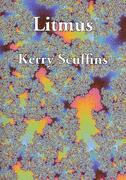 Litmus by Kerry Scuffins
Litmus by Kerry Scuffins
Five Islands Press, 2006
Litmus measures the world's volatile climate and shows the reader the cracks beneath the surface of society. The tongue-in-cheek title of this poetry collection acknowledges the binaries of society and then smashes through them with strong language and an even stronger sense of line. Kerry Scuffins is a loud poet: her lines are broken for meaning and for sound, her metaphors are in your face, and she makes no apologies for inserting politics and her opinions into her poetry. Some might argue that politics are a fickle thing to use, but her work is honest in its bluntness: you may not like or agree with her, but the cards are all on the table and they're face up.
Scuffins seems to enjoy the world: to her, poems about cats are as significant as poems about abuse. The range of this collection is impressive as is its bluntness. Scuffins does not shy away from her subject matter. Instead, she pushes forward with a sly smile. The world's fire is as important as its bluest moments, and if anything, Litmus is a measure for the world, a space in which to meditate on its spectrum.
A standout poem from Litmus is 'In Echuca'. This piece experiments with space and punctuation: Dickinson may have the dash but Scuffins has the slash. Here, the start-stop separation of the slashes represents the divide between boys and girls:
In Echuca/ boys are boys / and girls/
know their place / nowhere / now / here
In Echuca / birds are barred from the barrel
In Echuca / if your plumage is exotic/
better sing a very quiet song /
boys who like sex are studs /
yair 'e 'olds th crutchin' record /
girls who like sex / are sluts / Gerrorf
that town bike / where anorexia/
won't make ya nervosa / and real girls /
put fingers to lips / in bars / sshh/
Scuffins' politics are loud; but it is her punctuation that defines her points. It's exciting to see this poet move past storytelling or humor and really sink her teeth into poetry's possibilities. The nuance of this poem's punctuation and the way sounds seem as divided as the lines and the genders make this a layered text worth many a look.
Weaving the lines of poetry and politics successfully is a mighty task. This collection is consumed with the war of politics and though it is invigorating to see a poet stand up for what they believe, there are times when politics and statement overpower form and lyricism. For example, in the poem 'Monsters' the speaker talks about explaining that monsters do not exist to her son. The last stanza of the poem explains the son's reaction: 'Tom listened patiently / then looked me straight in the eye / and gave his reply – / 'Soldiers are monsters''. The point seems a bit too heavy, a bit too expected. Scuffins has a great sense of line, and it would have been nice to have seen her be more subtle. Still, it takes a poet with guts to talk of soldiers as monsters, especially in a world filled with war. Scuffins' fearlessness is certainly not to be discounted.
It can be seen that Scuffins is aware of the honesty and bluntness of her poems. In the poem 'Boo', for example, she shows her self-awareness in a mock literary and academic context:
I sat in a poetry workshop once
while everyone discussed
the horse in my poem.
One ventured that it was
the spirit of Autumn.
Another, that it represented
the old world, being supplanted
and dissolved by the new.
A third suggested, Freudishly,
that the horse might be
my father.
At the end I told tem
'He was a horse I had,
bay, fifteen-two.
His name was Boo.'
This is one of the wittier poems in the collection. Scuffins is coy: 'Freudishly' sounds too similar to 'foolishly' for the coincidence to be mere accident. The poem's title, the horse's name, seems to be a cry to the poetry workshops and the critics and to the literary notion of harping upon metaphor. The humour of the piece is as intoxicating as its slyness with word play.
When Scuffins is not weighed down with wars to rage against, her poems have a wildness worth exploring. The quieter poems of the collection can sometimes be lost in the shuffle, especially when placed near the louder or more humorous pieces, but they should not be discounted. In fact, these poems sometimes have the most moving or memorable of images and lines. For example, in 'Shadowland' Scuffins writes:
Stars are eyes. Trees breathe
tiny sighs. Here
I'm light years
from my race. Divorced.
Here, the language is intoxicating and more subtle; and yet it is also vivid and memorable. The poem's politics are understated, layered in with the line breaks (e.g. the smartly enjambed line: 'from my race. Divorced'). When Scuffins allows herself to breathe in the darkness, the shadows she creates are perhaps even more evocative and moving than the words she shouts at the top of a cliff.
Many of the poems are flippant and laugh-out-loud funny. Kerry Scuffins is a poet to watch for: she isn't afraid to go knee-deep into the muck and to staple the carcass of the society's demons to the wall. The poems in this collection may deal with serious subject matters, but they are going to shine a light on the humour behind the breakdowns.
Lisa Bower is a poet and currently lives in Roanoke, Virginia.









